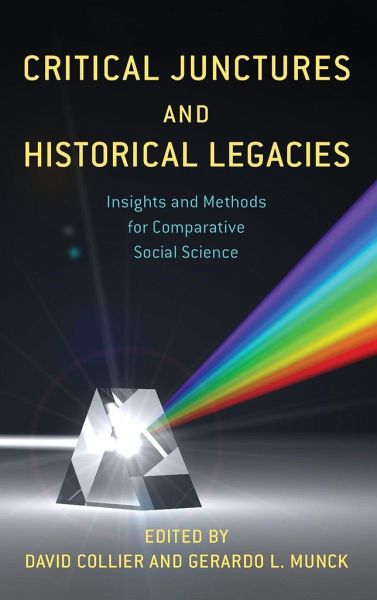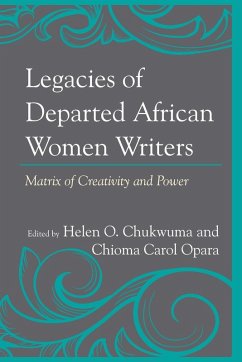Gebundenes Buch
Critical Junctures and Historical Legacies
Insights and Methods for Comparative Social Science
Herausgeber: Collier, David; Munck, Gerardo L.
Versandkostenfrei!
Versandfertig in 1-2 Wochen
Weitere Ausgaben:

PAYBACK Punkte
59 °P sammeln!




Critical juncture theory seeks to understand how social orders are created, become entrenched, and change. In this book, leading practitioners offer the first coordinated effort to define this field, assess its theoretical and methodological foundations, and use a critical assessment of current practices as a basis for guiding its future.
David Collier is Chancellor's Professor Emeritus at the University of California, Berkeley. His scholarly contributions were recognized in 2014, when he received the Johann Skytte Prize, the preeminent international award in the discipline of political science. At Berkeley, he served as Department Chair and Chair of the Center for Latin American Studies. His research focuses on democracy and authoritarianism, Latin American politics, comparative-historical analysis, and methodology. Collier's books include Shaping the Political Arena: Critical Junctures, the Labor Movement, and the Regime Dynamics in Latin America (with Ruth Berins Collier; Princeton University Press, 1991, reissued in 2002), which won the Best Book Prize of the APSA Comparative Politics Section and is a seminal work in the field of critical junctures and comparative historical analysis. His co-authored and co-edited methodological work includes Rethinking Social Inquiry: Diverse Tools, Shared Standards, 2nd expanded edition (Rowman & Littlefield, 2010); Statistical Models and Causal Inference: A Dialogue with the Social Sciences (Cambridge University Press, 2009); Concepts and Method in Social Science (Routledge, 2009), and The Oxford Handbook of Political Methodology (Oxford University Press, 2008). Within the American Political Science Association, he has served as President of the Organized Section for Comparative Politics, Vice President of the Association, and founding President of the Organized Section for Qualitative and Multi-Method Research. Collier is an elected Fellow of the American Academy of Arts and Sciences and of the American Association for the Advancement of Science. His more recent awards, along with the Skytte Prize, include the 2014 Frank J. Goodnow Award for Distinguished Service to Political Science and the American Political Science Association. Gerardo L. Munck is Professor in the Department of Political Science and International Relations at the University of Southern California (USC). His books include Authoritarianism and Democratization. Soldiers and Workers in Argentina, 1976-83 (Penn State University Press, 1998); Regimes and Democracy in Latin America (Oxford University Press, 2007); Passion, Craft, and Method in Comparative Politics (with Richard Snyder; Johns Hopkins University Press, 2007); Measuring Democracy: A Bridge Between Scholarship and Politics (Johns Hopkins University, 2009); A Middle-quality Institutional Trap: Democracy and State Capacity in Latin America (with Sebastián Mazzuca; Cambridge University Press, 2020); and Contemporary Latin American Politics: The Quest for Democracy and Citizenship Rights (with Juan Pablo Luna; Cambridge University Press, forthcoming, 2022). He is currently completing a book manuscript on the evolution of knowledge about the social world, entitled How Advances in the Social Sciences Have Been Made: The Study of Democracy and Democratization Since 1789. His articles have been published in the Annual Review of Political Science, World Politics, Comparative Politics, and Comparative Political Studies. The awards he has received include the 2003 Award for Conceptual Innovation in Democratic Studies, of the International Political Science Association (IPSA) Committee on Concepts and Methods (C&M) and the Facultad Latinoamericana de Ciencias Sociales (FLACSO), Mexico; and the Frank Cass Prize for Best Overall Article in Democratization in 2016.
Produktdetails
- Verlag: Rowman & Littlefield Publishers
- Seitenzahl: 496
- Erscheinungstermin: 7. März 2022
- Englisch
- Abmessung: 235mm x 157mm x 31mm
- Gewicht: 862g
- ISBN-13: 9781538166147
- ISBN-10: 1538166143
- Artikelnr.: 62552177
Herstellerkennzeichnung
Libri GmbH
Europaallee 1
36244 Bad Hersfeld
gpsr@libri.de
Für dieses Produkt wurde noch keine Bewertung abgegeben. Wir würden uns sehr freuen, wenn du die erste Bewertung schreibst!
Eine Bewertung schreiben
Eine Bewertung schreiben
Andere Kunden interessierten sich für














